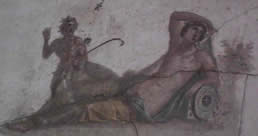Meet some Latin poets
Classical Latin poetry was in some measure, like all great cultural events, an accident of its age. That is not to belittle the talent of the poets; but the bedding down in native Latin soil of strands of influence, especially Greek, took time. Greek poetry was much studied and openly imitated by poets long before Virgil. It left its mark in many different ways: Roman poets would deliberately rework Greek stories and characters; they set their verses in Greek poetic metres; and even some of the phrasing and pronunciation were affected. By the time of Virgil this had been absorbed, experimented with, and internalised. Poets continued to work with Greek models in mind – that was de rigueur for Roman poets – but Latin verse had now found its own unique resonance.

Catullus (born c.84 BC)
His work ranges from what appear to be sincere and spontaneous outbursts of love and recrimination to more composed pieces on mythological subjects drawn from Greek literature. Several poems are addressed to his girlfriend ‘Lesbia’, which is almost certainly a pseudonym for Clodia, the wife of a consul and an influential, beautiful and independent woman, whose beach parties and sexual affairs were the talk of the town and law-courts. Catullus was not a political poet, though his open contempt for Julius Caesar and mockery of other establishment figures appeared at a time when his targets, unlike those of many later satirists, were still alive. He died close to his 30th year.
Virgil (born 70 BC)
The Aeneid is the story of Aeneas’s flight from Troy, of his romance with Dido and of his quest to settle in Italy and found the city of Rome. The music of Virgil’s poetry and his delicate manipulation of rhythms have given pleasure throughout the ages – despite the misgivings of generations of students in their rush for exam success. No other single Latin poem has the same range and depth: the human frailties of larger-than-life heroes; the tension between destiny and uncertainty; and the doggedness of pius Aeneas mirroring Virgil’s own undertaking to complete the poem (almost ten thousand lines).
Horace (born 65 BC)
He is perhaps best known for his Odes, short lyrical poems on themes of life, death, love and friendship, carefully crafted from Greek models. The seize-the-day motif can obscure a curious outsider, who found himself at the heart of the literary set in Augustan Rome. In some ways he is the least predictable of Latin poets. Swings of mood and sudden changes of direction enliven themes that are as old – and young – as time itself.
Propertius (born c.50 BC)
Four books of elegies survive. A Latin or Greek ‘elegy’ is so called because of its metre, the elegiac couplet: the first line is the hexameter (a weighty, sonorous line, used throughout the Aeneid and Metamorphoses) followed by the pentameter, which is shorter and nimbler, and brings the sentence or unit of sense neatly to a close.
Little is known of Propertius beyond what we read in his poetry. His candid tales of rough and tumble with his mistress ‘Cynthia’ went down well with Roman men and women of his day, and remained popular long after he lived. His girlfriend’s real name, we are told, was Hostia.
Tibullus (born c.48 BC)
An elegist similar to his contemporary, Propertius. Three books survive; the third is of disputed authorship. The conventional themes of his elegies do not disguise the fresh sincerity of the poet’s yearning to please his girlfriend Delia, whose real name, according to Apuleius (who also tells us of the identities of Catullus’ Lesbia and Propertius’ Hostia), was Plania.
Ovid (born 43 BC)
This remarkable half-century of poetic composition closes with the writing of Ovid, a witty, playful poet, who toys with now-established conventions of elegy and narrative epic. His Metamorphoses is a deft weaving of mythological stories into one poem – there is no better compendium of Greek and Roman myths. He was not tempted to scale the heights of Virgil’s epic, and his poetry perhaps does not match the sustained sense of inner fire and depth of feeling in the Aeneid, but the artful juxtaposition of stories in his Metamorphoses, the humorous twists and pathos too, as far as he allows it to go, have inspired a long queue of admirers and imitators.
Martial
Martial was active in the second half of 1st century AD. He wrote hundreds of short poems, called Epigrams. These poems were always teasing and some sharply critical or satirical. His targets were people known to him, his patrons and people with influence, not the emperor or those with serious power. The days of lewd references to the sex lives of powerful politicians (Catullus on Caesar) were over. Emperors were now enthroned, and lampooning was unwise. The satirist’s rub is not a wrestle with the world of ideas or ills of the wider political world, it’s the stress of dangerously crowded streets, ungenerous patrons, and noisy schoolmasters in the early hours.
Juvenal
Juvenal was another satirist whose targets were life’s more immediate irritations. His surviving poems, sixteen Satires, were written in the early part of the 2nd century AD. They are longer than Martial’s poems and tackled themes such as the folly of human ambition, the pretentiousness of wealth, the poverty of writers, and meanness to clients. Martial touched similar sores but picked on particular instances. Juvenal offered a more structured and imagined perspective if just as irreverent and even more tongue-in-cheek. As with Martial, Juvenal’s verse is flecked with everyday detail, with the bustle and clatter of busy street life.